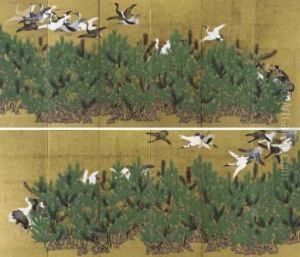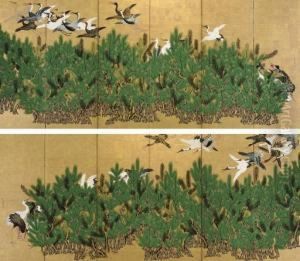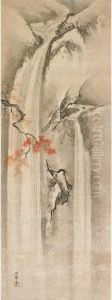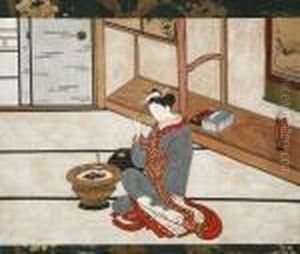Kano Toshun Paintings
Kano Toshun was a Japanese painter born in the year 1536. He was a member of the prestigious Kano school, which was the longest-lived and most influential school of painting in Japanese history, dominating Japanese art from the 15th to the 19th century. The Kano school was founded by Kano Masanobu (1434–1530) and was maintained by hereditary family succession. The Kano painters worked mainly for the shogunate and feudal lords, producing large-scale, highly formal works for decorating castles, villas, and temples.
Toshun was the son of Kano Motonobu, who was the second head of the Kano school and played a significant role in the development of the school's style. Toshun, whose given name was Shōei, took on the art name 'Toshun' later in life. He continued the tradition of the Kano school, which combined the detailed brushwork of Chinese academic painting with the bold, expressive use of ink typical of Japanese Zen Buddhist art. Toshun's work exemplified the Kano school's aesthetic during its formative years and contributed to the solidification of its style, which would influence Japanese painting for centuries.
Toshun's life was during the Sengoku period, a time of social upheaval, war, and castle building, which provided many opportunities for large-scale commissions. He likely worked on many such commissions throughout his career, though specific works attributed to him may not be well documented. As with many artists of the time, Toshun's legacy is also connected to his role as an educator and mentor within the Kano school, which was both a family lineage and an educational institution.
Kano Toshun died in 1602, leaving behind a legacy entwined with the Kano school's prominence in Japanese art. His contributions helped carry the school's traditions into the Edo period, a time when the school would reach the height of its influence. Although individual works by Toshun may not be as well-known as those by other members of the Kano school, his role as a bearer of the school's traditions and techniques was critical to its enduring success.




